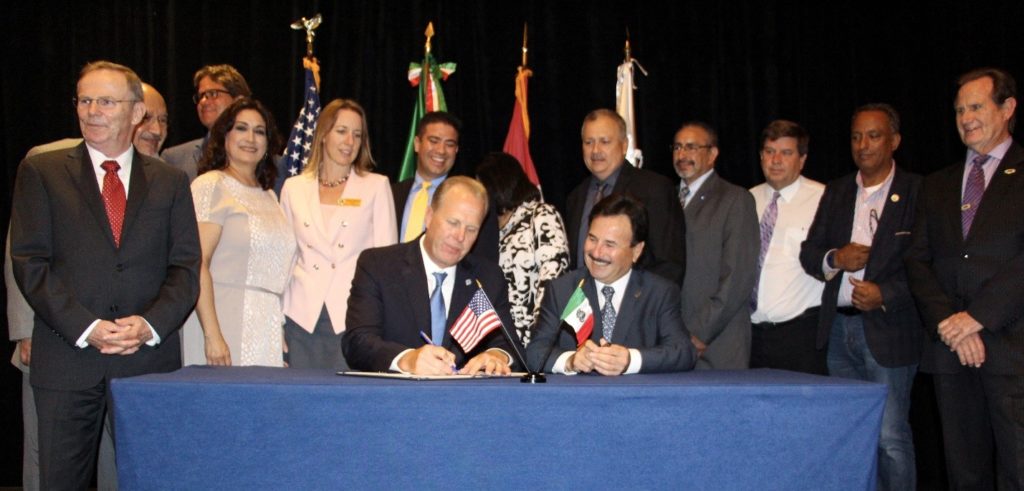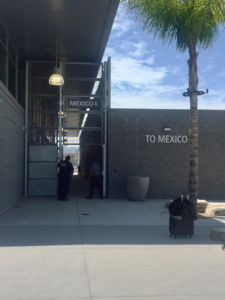August 4, 2017
California Senator Ben Hueso’s State Senate Bill 357 would establish a California trade office in Mexico City. The San Diego Regional Chamber of Commerce is the official sponsor of the bill recognizing the importance of having boots on the ground representation at the government and financial capital of our number one trading partner.
Q: Why have representation in Mexico?
A: A trade office is able to assist businesses enter a foreign market and remain competitive. It can also assist in promoting foreign investment in California. California has the sixth largest economy in the world and a leading trade and investment partner, yet we are the only border state without a trade office in Mexico.
Q: What are some examples of the services the office can provide?
A: The primary functions of a trade office include: promoting state businesses, help facilitating business delegations and trade shows, local government advocacy, and providing information and support on incentive packages, site selection, local workforce, and facilitating regulatory systems and permits.
Q: The State of California already has a very positive relationship with Mexico, is this simply motivated by the national political sentiment?
A: A similar bill was introduced by Senator Correa in 2013 long before the current national narrative on the U.S.-Mexico relationship. The bill received full support from the state legislature and the private sector recognizing back then the need for such state promotion in Mexico. The private sector has also supported other bills which would increase trade with Mexico such as the Enhanced Driver’s License bill. Both pieces of legislation were vetoed by Governor Brown. We are at a critical point with California in the spotlight leading on important national issues and in international trade, the relationship with China taking the forefront. It is important we demonstrate California’s commitment to the binational economic and political relationship.
Q: What need does the trade office in Mexico meet that is not currently being fulfilled?
A:
- Individualized State Promotion
There are federal government agencies with offices in Mexico, but none that have California’s interests as a priority. California can benefit from having someone specialized in California’s economy to promote investment opportunities in our state specifically.
- Quality and consistency of quality
The quality of the work provided by others depends on the workload and assistance can result in low performance when competing across U.S. interests.
Q: Why in Mexico City?
A: Mexico City is the commercial and political capital of Mexico. Having boots on the ground representation will strengthen the California and Mexico political and commercial relationship.
Q: How many states have representation in Mexico?
A: Twenty-five of the 50 U.S. states have at least one trade office in Mexico.
- California is the only state along the U.S.-Mexico border without a trade office in Mexico.
- 15 of the U.S. states with a trade office in Mexico rank Mexico as their first or second largest export market. Two additional rank it as third.
- Q. Why should California have representation in Mexico, but not necessarily in other countries?
- Mexico is the top market for exports from California – valued at over $25,250 million. Many states only have representation in Mexico and justify the focus with the value of trade the state conducts. Mexico is a priority export market.
- Some state trade offices in Mexico (i.e. Iowa) also provide assistance in South America for the same cost and eliminating the need for additional physical offices.
Q: Do you need a physical office with state employees?
A: Yes, it is important to have a physical presence in Mexico with a representative who is actively working to identify buyers for California goods and services as well as opportunities for California businesses to expand in Mexico. However, it is not necessary to have the office staffed by state employees. Many offices were previously structured in this way and were not economically sustainable. The common model seen across trade offices is to hire an independent contractor. This can be an individual or an existing company which specializes in trade promotion.
Q: What are the staffing needs of a trade office?
A: States have obtained representation in Mexico with as few as 1 to 2 employees.
Q: What is the typical cost?
A: $100,000 to $300,000 annually. As an alternative, the cost can be allocated on a project by project basis or as needed with a contract in place.
Q: Why were previous trade offices in Mexico closed?
A: A downturn in the economy and inefficiencies in the structure and management of the office have caused closures in the past. Under economic downturns, the state can eliminate or temporarily suspend funding. A way to address inefficiency concerns is to create metrics of success for the trade office and monitor the metrics closely. Also, the State (GO-Biz) can increase the rate of return by vetting companies seeking assistance to ensure they are export ready.
Q: Should the office be funded by the private sector?
A: 100 percent of state trade offices are publicly funded in order to prevent any perception of favoritism or bias. State funded and state backed offices also signal a greater commitment from the state which increases credibility and stability, two important factors for a prosperous businesses environment.
Q: In what way are California jobs and businesses adversely impacted on their relationship with Mexico by not having an office in Mexico?
A: California is competing with states who have a direct advocate in Mexico. Mexican businesses seeking to expand into the U.S. are participating in business visits organized by other states. In order to be competitive and attract businesses to California, we must have equal representation.
On a separate front, businesses seeking to expand into the Mexican market are at disadvantage in comparison to the rest of the states that do have an office as they are left to vet consultants on their own, and often receive misguided assistance or none at all. The private sector is collectively investing more time and resources in the services that this office could provide.
Case study:
San Diego Regional Chamber staff recently traveled to Guadalajara and met with two companies considering expansion into the U.S. market. One company is a nationwide transportation (trucking) company and the other is a restaurant chain. Both were considering Texas as their U.S. base of operations. Since the Chamber’s visit, which included promotion of California as the ideal location for the company headquarters, the restaurant business has selected San Diego, California. The Chamber is continuing talks with the trucking company to work on attracting their business to San Diego as well.
Like these businesses, many others consider location based on a wide variety of factors including tax incentives and regulations. California is as competitive as any other state given its ample workforce and quality of life, but the message and advocacy is left to chance without active representation.
For more information on SB 357 click here.






